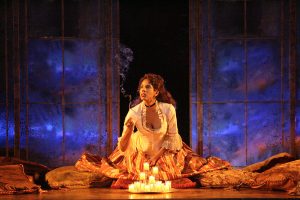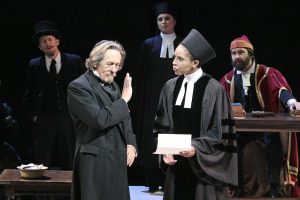The Merchant of Venice Illuminated by Old Globe Theatre Artists
Portia is the golden girl who rules The Merchant of Venice in Adrian Noble’s bracing production, now at the Old Globe Theatre for the summer.
In the stimulating person of Krystel Lucas, this daughter of power and privilege is the sort of paragon who gives aristocracy a good name. She has turned Belmont, her luxurious home, into a haven of love, beauty and order in the dark and restless world of Europe approaching the 20th Century.
Long bare platforms, scores of candles and a tinfoil lagoon lit from below in neon blue define Belmont in this utilization of Ralph Funicello’s summer set. Slide these around a bit, give Alan Burrett a moment to adjust his supple lighting and the scene becomes a brutal Venice, awash with Mahler, where everybody smokes, faces are slapped and cash flows.
Antonio, a handsome, melancholy capitalist played with sympathetic brooding by Donald Carrier, wishes to set up his young friend Bassanio – the clean-cut and appealing Lucas Hall, fresh from playing Puck – with enough walking-around money to enter the competition for the hand of Portia, a pursuit requiring the proper presentation. But Antonio is overextended so he must borrow the needed 3,000 ducats. The immediately available lender is Shylock the Jew.
Shakespeare, like all Elizabethans in a country where being a Catholic was a capitol offence, knew nothing of Jews. But he did know that Christopher Marlow had a big hit with The Jew of Malta, which feature a loathsome villain from the despised race of Christ-killers. Audiences loved to hate this monster and Shakespeare’s company wanted a piece of that. Except Shakespeare, as was his habit, made his Jew a human being, one able to appeal, with timeless eloquence, “Hath not a Jew eyes? … If you prick us do we not bleed?”
Noble’s Shylock is Miles Anderson, an extraordinary actor capable of isolating himself in any crowd and conjuring with a twitch worlds of complex choices. His Shylock is worn from a lifetime of abuse and contempt, annealed by endless self-control, stunted by cruel self-denial and ready to indulge himself in some payback. Yes, he can find 3,000 ducats to loan and no, he wants nothing so contemptible as financial interest. But. Just to make the deal interesting, why not say, if payment not be made in three months, he can collect a pound of Antonio’s flesh.
Bassanio is horrified but Antonio’s a sport. The pact is notarized and the plot starts ticking. Anderson’s Shylock allows himself a flash of contentment. He is playing with the big boys at last and he has scores to settle.
The outdoor air in the Lowell Davies Festival Theatre seems to freshen when we’re back in Belmont. Portia’s late father set up an elaborate test for potential suitors: Three casks, gold silver and lead, each with an appropriate hint inscribed, from which the candidate much choose. The winner gets the girl; runners-up pledge never after to woo or wed. After a pair of appalling losers – Nic Few as “a tawny Moor” with a big scimitar and an appetite for bling and Christopher Salazar as a bizarre Balkan with major ego issues – enter the comely young Bassanio, with whom everybody instantly falls in love. Especially Portia, who can hardly stand still from willing the ultimately successful choice.
Boy gets girl and that’s that, except time has been passing and Antonio’s fortunes remain grim. In fact, time is up and Shylock awaits his payment. And the three months has been tough of Shylock. His beloved daughter Jessica has deserted him by eloping with one of Bassanio’s pals, taking with her a considered trove of treasure and finding refuge, of course, at Belmont.
Portia, as happy as she is, realizes that all this needs sorting out before she can settle into wedded bliss so, disguised as a young legal scholar, she shows up in Venice to help the duke decided the Shylock-Antonio case. Which she does, with a procedural flair that could make certain supreme courts jealous. And her victory is devastating for poor Shylock who, among other penalties, must convert to Christianity (which, for an Elizabethan audience, was doing him a favor, in a time when there was no such thing as “religious tolerance,” by saving his soul.)
There’s nobody in this play who can out-maneuver Portia but Shylock gives it a good shot. His fatal flaw is that he lets all his pent-up hatreds take control and bypass his humanity, thus sadly forfeiting the grudging respect he’d earned by his constancy and, yes, his courage. The scene is a cyclone of emotional impacts, swirling around two actors grooved and dominating.
The denouement back at Belmont plays out neatly and Hall’s Bassanio even comes close to deserving this paragon of enlightened femininity. Noble steers the plot to a more satisfying finish than usual with some micro scenes. Some involve props (a yarmulke) or mere interrupted crossings of the stage. Others employ a gesture or a glance. One of the best is a sad, ghostly blessing. All are testaments to the art in this staging.[php snippet=1]Noble also allows a couple of actors extra leeway. John Lavelle turns Lancelot Gobbo, one of Shakespeare’s second-string clowns, into a fascinating vocal acrobat and Triney Sandoval makes Gratiano, a Bassanio pal, into a bouncing, sputtering motor-mouth quick to speed up the pace.
Everybody else looks good in Deirdre Clancy’s fin di siecle costumes and sells with the poise and focused interest of a ballet corps.
And all that Mahler is an excellent idea, inspired perhaps from the 1971 Luchino Visconti film Death in Venice, based on Thomas Mann’s book. Where that film overplayed one bit of the Fifth Symphony, Noble borrows more tastefully and spreads more broadly the music of an artist who himself knew the burdens of being a European Jew.
What a luxurious spread of art this production proves to be!
[box] Continues in rotation with A Midsummer Night’s Dream and Rosencrantz and Guildenstern Are Dead” through September, 2013.[/box]

Welton Jones has been following entertainment and the arts around for years, writing about them. Thirty-five of those years were spent at the UNION-TRIBUNE, the last decade was with SANDIEGO.COM.




